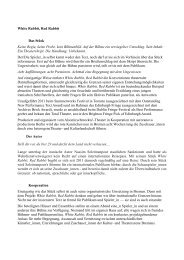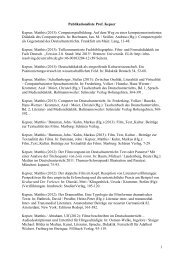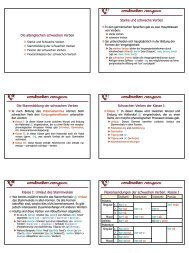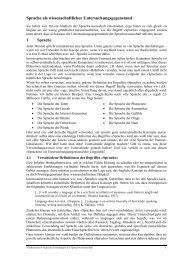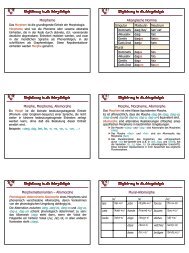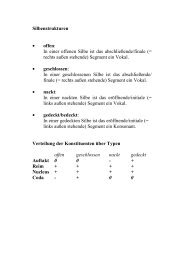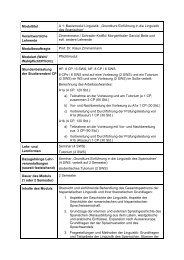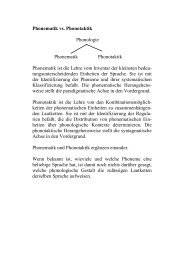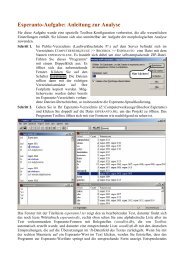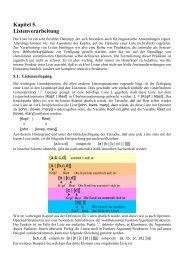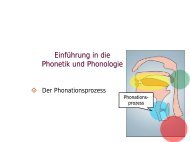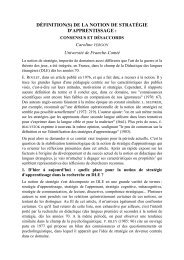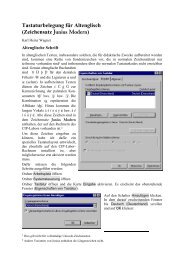Relativism and Universalism in Linguistics - Fachbereich 10 ...
Relativism and Universalism in Linguistics - Fachbereich 10 ...
Relativism and Universalism in Linguistics - Fachbereich 10 ...
Create successful ePaper yourself
Turn your PDF publications into a flip-book with our unique Google optimized e-Paper software.
Workshop 1 – Abr 143<br />
(1a) Nel’zja otkryvat’ okno. Na ulice xolodno ved’!<br />
neg.modaux open:ipf.<strong>in</strong>f w<strong>in</strong>dow.acc<br />
,It is not allowed to open the w<strong>in</strong>dow. ’ For it is cold outside. → deontic<br />
(1b) Nel’zja otkryt’ okno. Ručka slomana.<br />
neg.modaux open:pf.<strong>in</strong>f w<strong>in</strong>dow.acc<br />
,It is impossible to open the w<strong>in</strong>dow, because the h<strong>and</strong>le is broken.’ → alethic<br />
The mean<strong>in</strong>g of nel’zja ,cannot, must not’ is underdeterm<strong>in</strong>ed, the proper modal mean<strong>in</strong>g is<br />
an outcome of this modal together with the aspect of the verb (<strong>in</strong>f<strong>in</strong>itive).<br />
Second, deonticity is associated with control by an agent. This can be seen from the fact that<br />
negated imperatives, as a rule, require an ipf. verb (2). In this context, pf. verbs occur only as<br />
a k<strong>in</strong>d of “preventives” to warn the addressee about some undesirable consequences out of his<br />
control (3), i.e. of events that might occur given such <strong>and</strong> such circumstances (® alethic or<br />
epistemic):<br />
(2) Ne govori emu ob ėtom!<br />
neg speak:ipf.imp.sg him.dat about that.prep<br />
,Don’t tell him about that!’ → deontic<br />
(3) Smotri, ne progovoris’ (slučajno)!<br />
look:ipf.imp.sg neg blurt_out:pf.imp.sg accidentally<br />
,Be careful, don’t blurt it out (by accident)!’ → alethic, epistemic<br />
Without negation, the choice of aspect <strong>in</strong> an imperative is governed not by modal dist<strong>in</strong>ctions,<br />
but rather by the speaker’s assumption whether the addressee shares with him the<br />
presupposition that the denoted event (action) is about to occur, or not. The same holds for<br />
aspect choice <strong>in</strong> the scope of non-negated modals.<br />
Third, as concerns the role of (non-)f<strong>in</strong>iteness, it is true that the <strong>in</strong>f<strong>in</strong>itive <strong>in</strong> East Slavic (not<br />
<strong>in</strong> other Slavic languages) can often be used as an equivalent of the imperative, i.e. with a<br />
deontic function. Aspect as such however is rather irrelevant, <strong>and</strong> pf. verbs are usually used <strong>in</strong><br />
non-negated <strong>in</strong>dependent <strong>in</strong>f<strong>in</strong>itive clauses with a directive illocution; for <strong>in</strong>stance: Emu<br />
javit’sjapf v kommendanturu! ,He is to appear at the comm<strong>and</strong>ant’s office!’, Zakončit‘pfėto<br />
bezobrazie! ,Stop with these foolish th<strong>in</strong>gs!’.<br />
Fourth, Russian <strong>in</strong>dependent negated <strong>in</strong>f<strong>in</strong>itive clauses <strong>in</strong> general have an epistemic or<br />
participant-<strong>in</strong>ternal mean<strong>in</strong>g (for this term cf. van der Auwera/Plungian 1998); for <strong>in</strong>stance:<br />
(4a) Emu ne spravit’sja s takim zadaniem.<br />
him.dat neg cope_with with such.<strong>in</strong>s task.<strong>in</strong>s<br />
,He is not be able to cope with such a task.’<br />
Such clauses are synonymous with f<strong>in</strong>ite clauses of the same respective pf. verbs:<br />
(4b) On ne spravitsja s takim zadaniem.<br />
he.nom neg cope_with with such.<strong>in</strong>s task.<strong>in</strong>s<br />
,He will not get ready with such a task.’ (@ ,He is not able to cope with …’)<br />
Non-negated clauses with the present-stem of pf. verbs also have a participant-<strong>in</strong>ternal <strong>and</strong><br />
“omnipresent” mean<strong>in</strong>g, for <strong>in</strong>stance:<br />
(5) Ona razrešit ljuboj konflikt.<br />
she.nom solve:pf.prs.3.sg any.accn.m.sg conflict.acc.m.sg<br />
,She solves (will solve) any conflict.’(@ ,…is able to solve …’)



